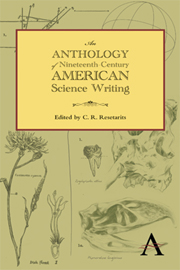Book contents
- Frontmatter
- Contents
- Preface
- Part One 1800–1846 Naturals and Naturalists
- Part One Introduction
- “A Memoir on the Discovery of Certain Bones of a Quadruped of the Clawed Kind in the Western Parts of Virginia,” Transactions of the American Philosophical Society (1799)
- “Pileated Woodpecker,” American Ornithology; or the Natural History of the Birds of the United States (1801)
- “Currents,” The New American Practical Navigator (1802)
- “Account of a North American Quadruped, supposed to belong to the Genus Ovis, Rocky-Mountain Sheep, Ovis Montana,” Journal of the Academy of Natural Sciences of Philadelphia (1817)
- “A Monograph of North American insects, of the genus Cincindela” (excerpt) Transactions of the American Philosophical Society (1818)
- “On the Genus Ocythoe,” Philosophical Transactions of the Royal Society of London (1819)
- “Preface,” American Entomology, or Descriptions of the Insects of North America (1824–28)
- “Preface” (excerpt), The Genera of North American Plants and a Catalogue of the Species, to the Year 1817 (1818)
- “Pileated Woodpecker,” Manual of the Ornithology of the United States and Canada (1832)
- “Introduction,” Ichthyologia ohiensis, or natural history of the fishes inhabiting the river Ohio and its tributary streams (1820)
- “Notices of Materia Medica, or new medical properties of some American Plants,” Western Minerva or, American Annals of Knowledge and Literature (1820)
- “Passenger Pigeon,” Ornithological Biography (1831)
- “On the Production of Currents and Sparks of Electricity from Magnetism,” American Journal of Science and Arts (July 1832)
- “The Contagiousness of Puerperal Fever” (excerpts), New England Quarterly Journal of Medicine (1843)
- “On the Two Storms Which Were Experienced throughout the United States, in the Month of February, 1842” (excerpt) Transactions of the American Philosophical Society (1845)
- Part Two 1846–1876 Warriors
- Part Three 1876–1900 Scientists
- Bibliography
“Notices of Materia Medica, or new medical properties of some American Plants,” Western Minerva or, American Annals of Knowledge and Literature (1820)
from Part One - 1800–1846 Naturals and Naturalists
Published online by Cambridge University Press: 05 June 2012
- Frontmatter
- Contents
- Preface
- Part One 1800–1846 Naturals and Naturalists
- Part One Introduction
- “A Memoir on the Discovery of Certain Bones of a Quadruped of the Clawed Kind in the Western Parts of Virginia,” Transactions of the American Philosophical Society (1799)
- “Pileated Woodpecker,” American Ornithology; or the Natural History of the Birds of the United States (1801)
- “Currents,” The New American Practical Navigator (1802)
- “Account of a North American Quadruped, supposed to belong to the Genus Ovis, Rocky-Mountain Sheep, Ovis Montana,” Journal of the Academy of Natural Sciences of Philadelphia (1817)
- “A Monograph of North American insects, of the genus Cincindela” (excerpt) Transactions of the American Philosophical Society (1818)
- “On the Genus Ocythoe,” Philosophical Transactions of the Royal Society of London (1819)
- “Preface,” American Entomology, or Descriptions of the Insects of North America (1824–28)
- “Preface” (excerpt), The Genera of North American Plants and a Catalogue of the Species, to the Year 1817 (1818)
- “Pileated Woodpecker,” Manual of the Ornithology of the United States and Canada (1832)
- “Introduction,” Ichthyologia ohiensis, or natural history of the fishes inhabiting the river Ohio and its tributary streams (1820)
- “Notices of Materia Medica, or new medical properties of some American Plants,” Western Minerva or, American Annals of Knowledge and Literature (1820)
- “Passenger Pigeon,” Ornithological Biography (1831)
- “On the Production of Currents and Sparks of Electricity from Magnetism,” American Journal of Science and Arts (July 1832)
- “The Contagiousness of Puerperal Fever” (excerpts), New England Quarterly Journal of Medicine (1843)
- “On the Two Storms Which Were Experienced throughout the United States, in the Month of February, 1842” (excerpt) Transactions of the American Philosophical Society (1845)
- Part Two 1846–1876 Warriors
- Part Three 1876–1900 Scientists
- Bibliography
Summary
THE Erythronium albidum of Nuttall is a common plant near Lexington, where it is called Lambs-tongue. The root or bulb is used against the Scrophula [sic], being stewed with milk or cream, and applied to the scrophulous [sic] sores, which it will cure. The yellow flowered species or Erythronium luteum, has probably the same property. – Communicated by Mr. Crockett, a medical student.
The Bear-grass is not a grass; but a fine rare plant peculiar to the western states, the Helonias angustifolia of Michaux, which I have ascertained to be different from Helonias and called Cyanotris pratensis. Its bulb or root is employed in Kentucky and near Lexington for the cure of the Inflamed Breast: it is mashed and applied to the part as a poultice – Communicated by Mr. Crockett.
The Helenium autumnale is called Sneezeweed in Kentucky, owing to its strong sternutory [sic] properties. If the flowers are dried and snuffed, they will occasion a strong fit of sneezing.
The root and leaves of the Evonymus atropurpureus, which are called Arrow-wood or Wahoon in Kentucky, are used with efficiency in the Influenza, Cough, Colds &c. in the shape of tea or decoction.
Dr. Samuel Brown having procured and shown me the plant which is said to occasion in Kentucky the Milk Fever, I have ascertained that it is the Euphorbia peploides (E. peplus of Pursh, not Lenneus) which is not uncommon on the cliffs and rocky situations in Kentucky. When eaten by cows through chance, it gives them a fever, and their milk becomes poisonous, producing the milk fever in those who drink it.
Many plants are called Gentian in Kentucky and used as succedanea of the foreign Gentian; they are Triosteum major and Tr. minor, Sabatia angularis, Gentiana amarelloides, and several other species of this last genus.
The root of the large Plantain, Plantago major, has lately been recommended in Europe as a good febrifuge.
The Water Horehound, or Lycopus virginicas, has lately been discovered to be an excellent remedy in Hemoptysis or spitting of blood. It is used in decoction or tea-like.
- Type
- Chapter
- Information
- Publisher: Anthem PressPrint publication year: 2012



